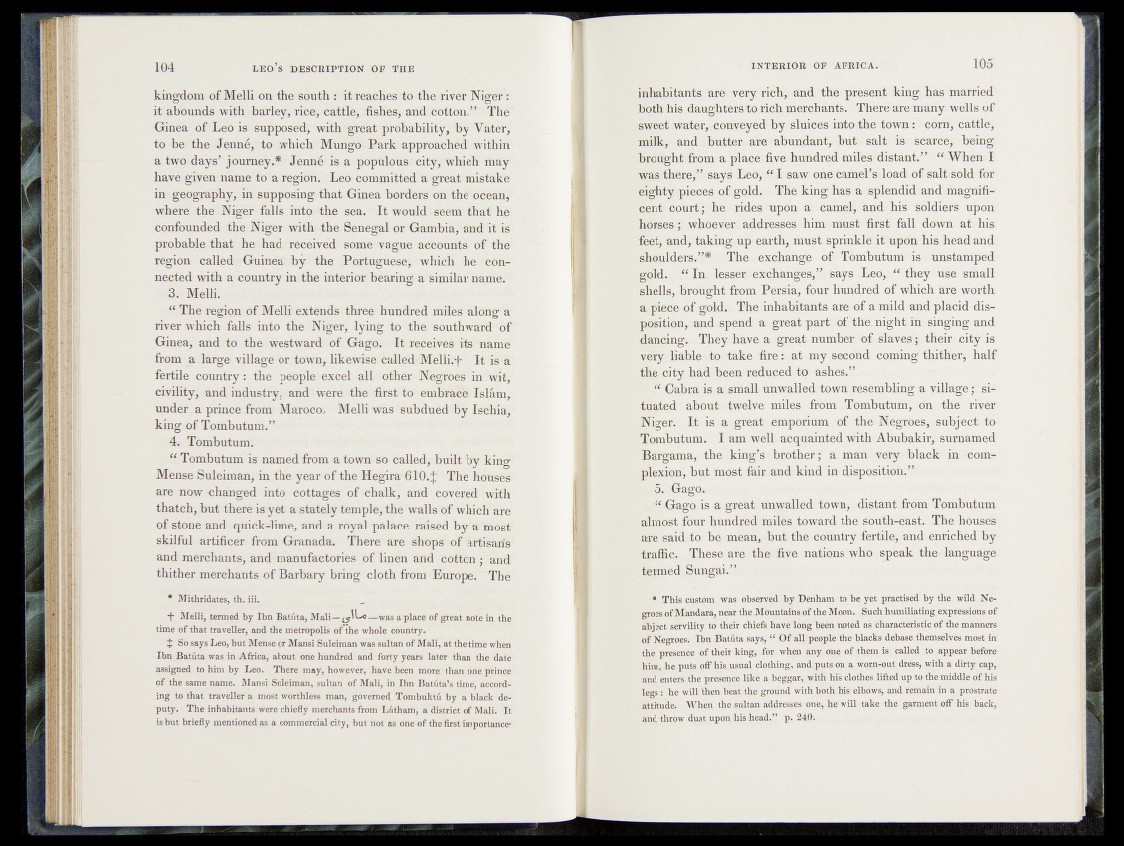
kingdom of Melli on the south : it readies to the river Niger;
it abounds with barley, rice, cattle, fishes, and cottón.” The
Ginea of Leo is;;supposbd> with great probability, by Vater;
to be the Jenné, to which Mungo Bark approached within
a two days’ journey.* Jenné is a populous city, which may
have given name to a region. Leo committed a great mistake
in geography, in supposing that Ginea borders on the ocean,
where the‘ Niger falls into the sea. It would seem' that he
confounded the Niger with the Senegal or Gambia, and it is
probable that he had received some vague accounts of the
region called Guinea by the Portuguese, which he connected
with a country in the interior bearing a similar name.
3. MelhV
É The region of Melli extends three hundred miles along a
river which falls into the Niger, lying to the southward of
Ginea, and to the westward of Gago. It receives its name
from a large village or town, likewise called Melli.-f It ife'a
fertile country: the people excel all other Negroe^ in, wit,
civility, and industry, and were the first to embrace Tslém,
under a prince from Maroco, Melli was subdued lS|f Ischia/
king of Tombutum.”
4. Tombutum.
“ Tombutum is named from a town so called, built by king
Mense Suleiman, in the year of the Hegira 610.£ The houses
are now -changed into cottages of chalk, and covered with
thatch, but there is yet a stately temple, the walls of which are
of stone and quick-lime, and a royal palace raised by a most
skilful artificer from Granada. There are shops of artisarfs
and merchants, and manufactories of linen and cotton ; and
thither merchants of Barbary bring cloth from Europe. The
* Mithridates, th. iii. __
+ Melli, termed by Ibn Batuta, Mali— —was a place of great note in the
time of that traveller, and the metropolis of the whole country.
+ So says Leo, but Mense or Mansi Suleiman was sultan of Mali, at the time when
Ibn Batuta was in Africa, about one hundred and forty years later than the date
assigned to him by Leo. There may, however, have been more than one prince
of the same name. Mansi Soleiman, sultan of Mali, in Ibn Bat&a’s time,' according
to that traveller a most worthless man, governed. Tómbuktfi by a black deputy.
The inhabitants were chiefly merchants from Ldtham, a district of Mali. It
is but briefly .mentioned as a commercial city, but not as one of the first importance*
inhabitants are very rich, and the present king has married
both his, daughters tbhieh merchants. There are many wells of
sweet- water, conveyed by, sluices into the town : corn, Cattle,
milk, and butter are abundant, but salt is- scarce; being
brought! from a place five hundred miles distant.” “ When I
was there,” says Leo, “ I .saw-b&e camel’s load of salt sold for
eighty pieces of gold. The king has a splendid and magnificent
court; he rides upon à'îëaiH6lf;ihnld*his soldiers upon
horses ; whoever addresses him hnusi first: fall down at. his
feet, and, taking up earth, must, sprinkle it upon his head and
shoulders.”* The exchange of Tombutum ifiè’ unstamped
gold. u In, lesser exchanges,” says Leo, “ they use small
shells, brought from Persia, four hundred of which are worth
a piece of gold. The inhabitants are of a mild and placid disposition,
and spend a great part of the night in !singing and
dancing. They have a great number of slaves ; their city is
very liable to take fire: at my second coming thither, half
the city had been reduced to -iHshesw’- i
“ Cabra.is a small unwalled town resembling a village; situated
about twelve miles from . Tombutum, on the river
Niger. ! It is a great emporium of the Negroes, subjtect to
Tombutum. I am well acquainted with Abubakir, surnamed
!Bargama, the king’s brother ; a man very black in complexion,
but most fair and kind in disposition.”
5. Gago. |j
, “ Gago is a great unwalled town, distant from Tombutum
almost four hundred miles toward the south-east. The houses
are said to be mean, but the country fertile, and enriched by
traffic. These are the five nations who speak the language
termed Sungai.”
* This custom was observed by Denham to be yet practised by the wild Negroes
of Mandara, near the Mountains of the Moon. Suchhumiliating expressions of
abject servility to their chiefs have long been noted as characteristic of the manners
of Negroes. Ibn Batûta says, “ Of all people the blacks debase themselves most in
the presence of their king, for when any one of them is called to appear before
him, he puts off’ hisjisual clothing, and puts on a worn-out dress, with a dirty cap,
and enters the presence like a beggar, with his clothes lifted up to the middle of his
legs : he will then beat the ground with both his elbows, and remain in a prostrate
fttitude. • When the sultan addresses one, he will take the garment off his back,
and throw dust upon his head.” p. 240.